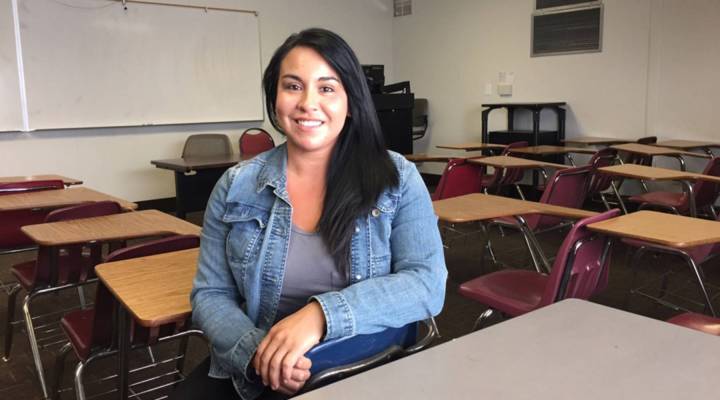
Community college tries fixing roadblocks to completion

Just before noon on a recent Thursday, Robert Piluso’s English 1A class was wrapping up at Mt. San Antonio College near Los Angeles. Many of his busy students headed off to jobs or home to take care of children.
“Great work, everybody,” Piluso told the class. “I’ll see you Monday. “
At Mt. SAC, as it’s known, just half of the 29,000 students finish a degree or transfer to a four-year college within six years. Piluso’s class is part of the community college’s strategy to get more students to graduation faster by packing three semesters’ worth of work into one semester, plus a short winter intercession. Students meet four days a week, starting with remedial composition before moving through two college-level writing courses.
| California community colleges try to boost graduation rates |
| A new approach to increasing low-income college grads |
| When going to college becomes a financial risk |
“By the end of June, they’ll be done with all of their composition requirements to transfer to UC or Cal State,” Piluso said.
More than three-quarters of Mt. SAC students need to take remedial English or math before they can move on to college-level classes. Many students give up before they get there.
Mt. SAC is part of a growing effort to prevent students from being bogged down in remedial classes by rethinking how students are placed in the classes, offering accelerated options or eliminating noncredit courses. At Mt. SAC, a student starting out at the lowest level in math has a 1.3 percent chance of making it to college-level classes, said Don Sciore, associate dean of instruction.
“There are so many obstacles and so many exit points that we’re not getting them to our programs,” he said.
Retention and completion rates are higher for the compressed classes than for traditional classes, Piluso said. The camaraderie helps, said student Janelle Yanez, 27.
“You build a support group with the students, because they carry on through each class,” she said. “We help each other stay accountable.”
Yanez plans to transfer to Cal State Los Angeles in the fall for a bachelor’s degree in fire science. She’s in the Air National Guard and using her military benefits to pay for college.
“The faster I get done using, it the more benefits I have to carry on to other things,” she said.
The college is also trying to make its developmental courses more relevant. Starting in the fall, classes will be built around eight career clusters. Piluso will teach an English class geared toward students interested in the fine arts. Other sections will incorporate health care or business concepts.
“If they’re in it sooner, they have the information sooner about what that career field entails,” Piluso said. “And they can make decisions sooner of whether to stick with it or whether to choose another discipline.”
There’s a lot happening in the world. Through it all, Marketplace is here for you.
You rely on Marketplace to break down the world’s events and tell you how it affects you in a fact-based, approachable way. We rely on your financial support to keep making that possible.
Your donation today powers the independent journalism that you rely on. For just $5/month, you can help sustain Marketplace so we can keep reporting on the things that matter to you.












